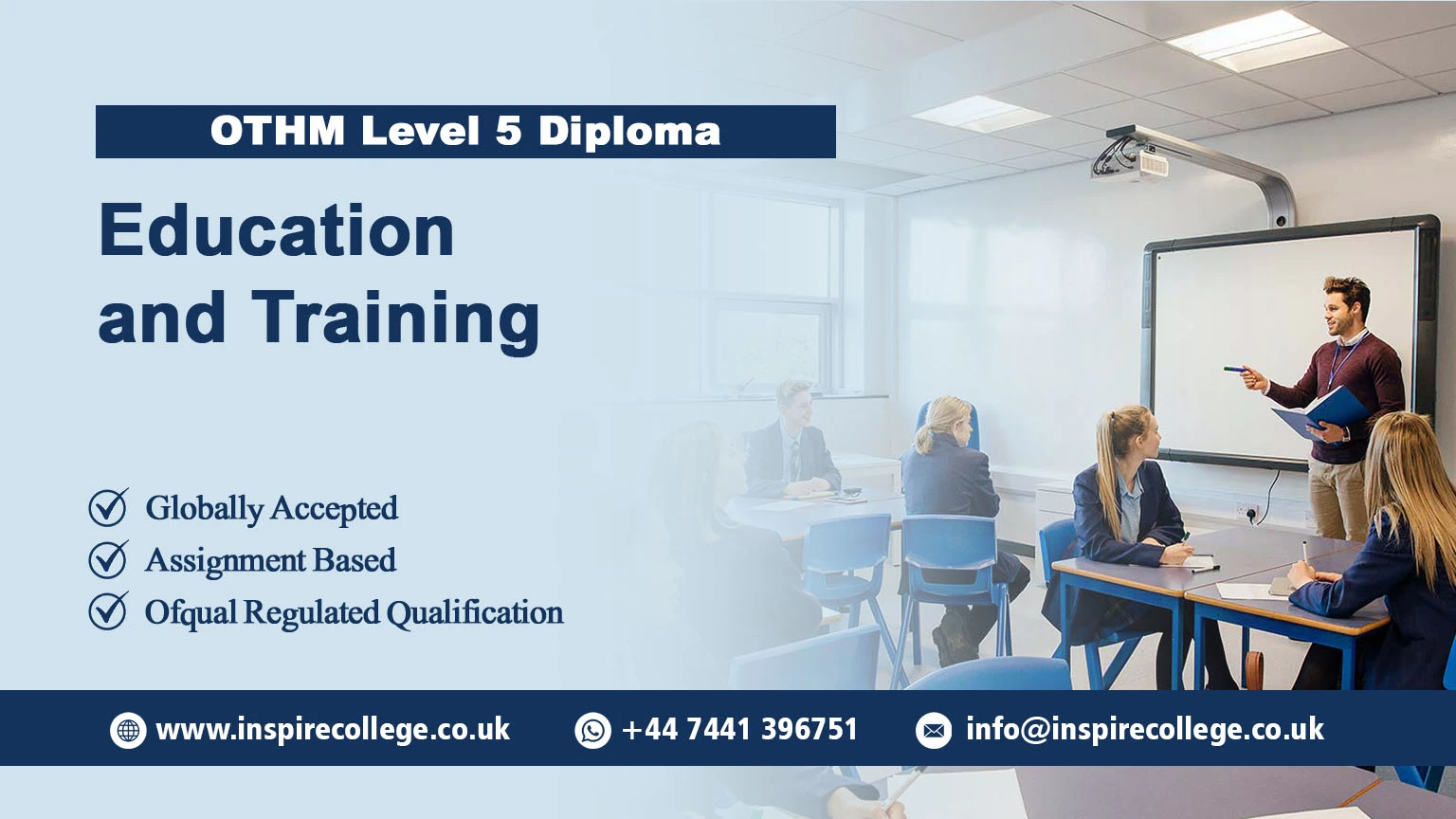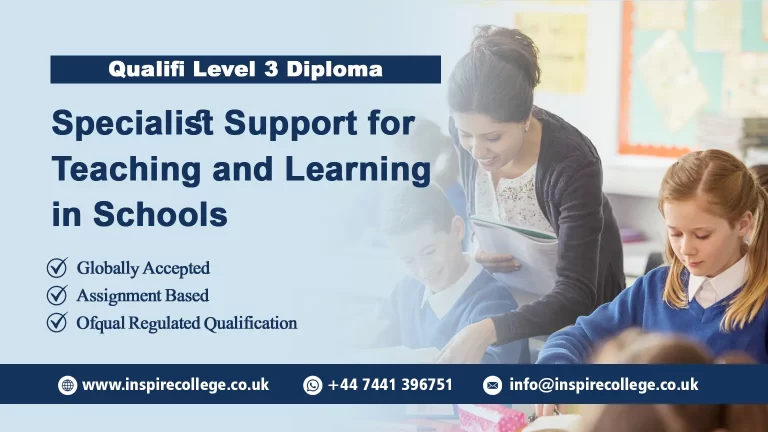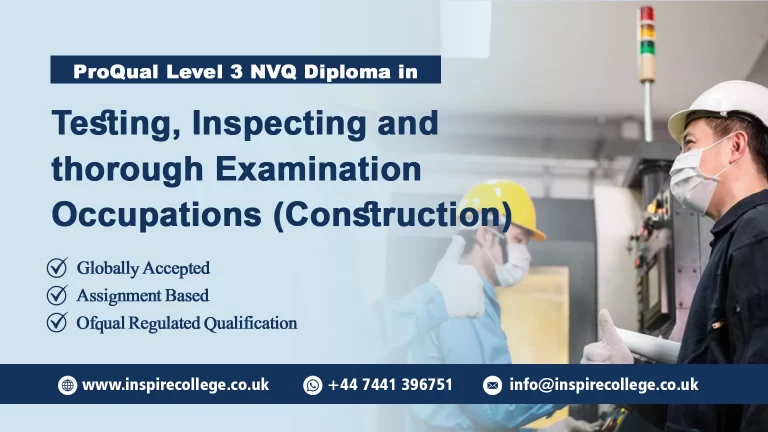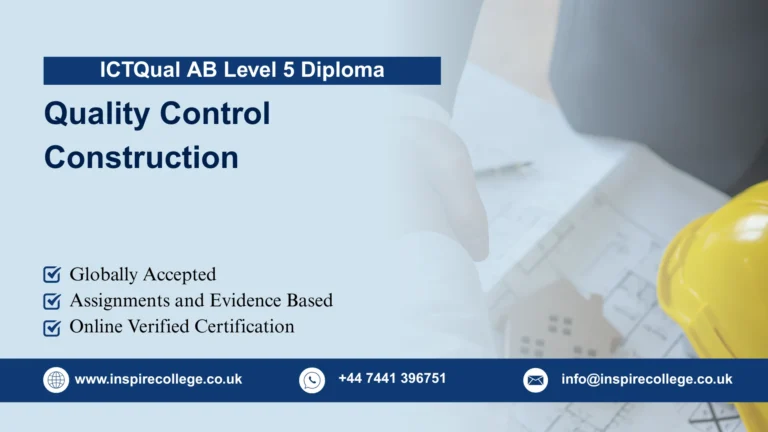
OTHM Level 5 Diploma in Education and Training
In today’s dynamic educational landscape, effective teaching and training are pivotal to the success of any learning institution or organization. The OTHM Level 5 Diploma in Education and Training is a comprehensive qualification designed to equip educators, trainers, and instructional leaders with the skills and knowledge necessary to excel in their roles. This diploma is more than just a credential; it is a gateway to advanced teaching methodologies and a profound understanding of the educational process.
The OTHM Level 5 Diploma in Education and Training provides an in-depth exploration of educational theories, teaching practices, and assessment techniques. This qualification is aimed at individuals who are already working or aspire to work in educational settings, including further education, adult education, and training environments. The diploma is structured to enhance both theoretical knowledge and practical application, ensuring that graduates are well-prepared to meet the demands of modern education and training.
One of the key components of the OTHM Level 5 Diploma is its focus on effective teaching strategies. Participants will delve into various pedagogical approaches, learning styles, and classroom management techniques. This ensures that they are equipped to deliver engaging and impactful lessons that cater to diverse learner needs. Additionally, the diploma covers essential aspects of curriculum design and development, enabling educators to create structured and effective learning experiences.
Assessment is another critical area addressed by the OTHM Level 5 Diploma. The program emphasizes the importance of designing and implementing various assessment methods to evaluate learner progress and achievement. This includes formative and summative assessments, as well as feedback mechanisms that support continuous improvement and learner development.
Furthermore, the diploma addresses the role of the educator in fostering a positive learning environment. Topics such as motivational techniques, inclusive teaching practices, and managing learner behavior are explored to help educators create supportive and effective educational settings. This holistic approach ensures that graduates are not only skilled in delivering content but also in supporting and inspiring their learners.
The OTHM Level 5 Diploma in Education and Training is also designed to accommodate the diverse needs of its participants. With flexible study options and a focus on practical application, the diploma is suitable for working professionals who wish to advance their careers without interrupting their current roles. The qualification is recognized for its rigorous standards and relevance to contemporary educational practices, making it a valuable asset for anyone looking to enhance their expertise in education and training.
The OTHM Level 5 Diploma in Education and Training stands out as a premier qualification for those committed to advancing their careers in the educational sector. By providing a thorough grounding in teaching methodologies, assessment techniques, and learner support, this diploma ensures that graduates are well-prepared to make a significant impact in their educational environments. For professionals seeking to elevate their practice and contribute to the future of learning, the OTHM Level 5 Diploma in Education and Training offers a pathway to achieving these goals with distinction.
For entry onto the OTHM Level 5 Diploma in Education and Training qualification, learners must:
- Hold a relevant vocational and/or academic qualification of at least the level above that of their learners and ideally a minimum Level 3 qualification in his/her own area of specialism.
- Have access to 100 teaching practice hours during which learners have full responsibility for planning, delivering and assessing specific area/s of the institution’s provision.
- Minimum core of literacy, language, numeracy and ICT
- Learners must be 19 years old or older at the beginning of the course
- English requirements: If a learner is not from a majority English-speaking country, they must provide evidence of English language competency.
Mandatory Units
The OTHM Level 5 Diploma in Education and Training qualification consists of 4 mandatory units plus 8 optional units, 1200 hours Total Qualification Time (TQT), and the recommended Guided Learning Hours (GLH) for this qualification is a minimum of 360. The maximum guided learning hours will be determined by the optional units selected.
To achieve the OTHM Level 5 Diploma in Education and Training, learners must achieve a minimum of 120 credits; 75 credits must be achieved from the mandatory units in Group A, plus a minimum of 45 credits from the optional units in Group B.
A minimum of 61 credits must be at Level 5 (therefore a minimum of 6 optional credits must be achieved at Level 5)
The learner will need to meet the requirements before OTHM can award the qualification, i.e. achieve the appropriate mandatory and optional units, as well as satisfactorily complete teaching practice.
Mandatory Units: Group A
Optional Units: Group B
Learning outcomes for OTHM Level 5 Diploma in Education and Training
Teaching, learning and assessment in education and training
- Understand roles, responsibilities and relationships in education and training.
- Be able to use initial and diagnostic assessment to agree individual learning goals with learners.
- Be able to plan inclusive teaching and learning.
- Be able to create and maintain a safe, inclusive teaching and learning environment.
- Be able to deliver inclusive teaching and learning.
- Be able to assess learning in education and training.
- Be able to implement expectations of the minimum core in planning, delivering and assessing inclusive teaching and learning.
- Be able to evaluate own practice in planning, delivering and assessing inclusive teaching and learning.
Theories, principles and models in education and training
- Understand the application of theories, principles and models of learning in education and training.
- Understand the application of theories, principles and models of communication in education and training
- Understand the application of theories, principles and models of assessment in education and training
- Understand the application of theories and models of curriculum development within own area of specialism.
- Understand the application of theories and models of reflection and evaluation to reviewing own practice.
Developing teaching, learning and assessment in education and training
- Be able to investigate practice in own area of specialism.
- Be able to apply theories, principles and models of learning, communication, and assessment to planning inclusive teaching and learning.
- Be able to apply theories of behaviour management to creating and maintaining a safe, inclusive teaching and learning environment.
- Be able to apply theories, principles and models of learning and communication to deliver inclusive teaching and learning.
- Be able to apply theories, models and principles of assessment to assessing learning in education and training.
- Be able to implement expectations of the minimum core in planning, delivering and assessing inclusive teaching and learning.
- Be able to apply theories and models of reflection and evaluation to the evaluation of own practice in planning, delivering and assessing inclusive teaching and learning.
Wider professional practice in education and training
- Understand professionalism and the influence of professional values in education and training
- Understand the policy context of education and training.
- Understand the impact of accountability to stakeholders and external bodies on education and training.
- Understand the organisational context of education and training.
- Be able to contribute to the quality improvement and quality assurance arrangements of own organisation.
Optional Units:
Develop and prepare resources for learning and development
- Understand principles underpinning development and preparation of resources for learning and development
- Be able to develop resources to meet learning and development needs.
Develop learning and development programmes
- Understand the principles underpinning the development of learning and development programmes.
- Be able to develop learning and development programmes
- Be able to review learning and development programmes.
Equality and diversity
- Understand the key features of a culture which promotes equality and values diversity.
- Understand the importance of promoting equality and valuing diversity in lifelong learning.
- Be able to promote equality and value diversity.
- Understand how to help others in the promotion of equality and valuing of diversity
- Be able to review own contribution to promoting equality and valuing diversity in lifelong learning.
Evaluating learning programmes
- Understand the principles of evaluating learning programmes.
- Understand and use evaluation methods
- Understand and use evaluation methods
- Understand how evaluation results can be used to improve learning programmes.
- Understand how to evaluate the effectiveness of own practice.
Identify the learning needs of organisations
- Understand the principles and practices of learning needs analysis for organisations.
- Be able to conduct learning needs analysis for the organisation
- Be able to agree organisational learning and development plans with relevant people.
Manage learning and development in groups
- Understand the principles and practices of managing learning and development in groups.
- Be able to manage group learning and development environments.
- Be able to apply methodologies to manage learning and development in groups.
- Be able to manage learning and development in groups to comply with legal and organisational requirements.
Understanding and managing behaviours in a learning environment
- Understand the characteristics and impact of behaviours in a learning environment.
- Understand legislation and organisational policies relating to managing behaviours in a learning environment
- Be able to apply theories of behaviour management to create and maintain a purposeful learning environment
- Be able to evaluate own practice in managing behaviours in a learning environment.
Action research
- Understand the purpose and nature of action research.
- Be able to initiate action research.
- Understand ways of carrying out action research
- Be able to carry out action research.
- Be able to present the outcomes of action research.
- Be able to evaluate own practice in relation to action research.
Delivering Employability Skills
- Understand the difference between employability skills and employment skills
- Understand the personal qualities, skills and competencies for employability skills delivery
- Understand how to plan and deliver creative, innovative and inclusive sessions appropriate for employability skills delivery
- Understand how to use group contracts, rewards, and penalties to reflect the workplace
- Be able to use techniques and practices that reflect the workplace
- Understand the need for continuous personal development to reflect changing sector/ marketplace requirements
Effective Partnerships Working in the Learning and Teaching Context
- Understand the purpose and nature of partnership working
- Understand the purpose, aims and objectives of a partnership
- Understand the structure and management of a partnership
- Understand how to measure and report on a partnership’s outputs
- Understand how to communicate effectively within a partnership
- Understand the wider context within which a partnership operates
Engage with Employers to Facilitate Workforces Development
- Understand the opportunities available for workforce development
- Understand how to engage with employers to promote workforce development
- Understand how to design learning and development opportunities in the workplace
- Understand how to facilitate learning and development opportunities in the workplace
- Engage with employers on workforce development issues
- Work with employers to facilitate workforce development solutions
Inclusive practice
- Understand factors which influence learning
- Understand the impact of policy and regulatory frameworks on inclusive practice
- Understand roles and responsibilities relating to inclusive practice
- Understand how to create and maintain an inclusive learning environment
- Understand how to evaluate own inclusive practice
Internally Assure the Quality of Assessment
- Plan the internal quality assurance of assessment
- Internally evaluate the quality of assessment
- Internally maintain and improve the quality of assessment
- Manage information relevant to the internal quality assurance of assessment
- Maintain legal and good practice requirements when internally monitoring and maintaining the quality of assessment
Preparing for the Coaching Role
- Understand own role and responsibilities in relation to coaching
- Understand the use of coaching in a specific context
- Understand how to identify client goals and outcomes
Preparing for the Mentoring Role
- Understand own role and responsibilities in relation to mentoring
- Understand the use of mentoring in a specific context
- Understand how to identify client goals and outcomes
Preparing for the Personal Tutoring Role
- Understand own role and responsibilities in relation to the personal tutoring role
- Understand factors affecting learners’ approaches to learning
- Understand the use of personal tutoring in a specific context
- Understand how to create personal learning targets
Principles and Practice of Lip-reading Teaching
- Understand the physiological processes and psychological functions of hearing
- Understand the effects of acquired hearing loss
- Understand ways in which amplification and lip-reading are optimised by those with hearing loss
- Understand the phonology of spoken English and its application to lip-reading learning and teaching
- Use specialist techniques and methodology for teaching lip-reading
- Understand assistive aids and services available to those with acquired hearing loss
Specialist Delivery Techniques and Activities
- Understand the role of specialist delivery techniques in a specific area
- Be able to develop specialist delivery techniques and learning activities in own specific area
- Be able to use specialist delivery techniques and learning activities
- Be able to evaluate own practice in relation to specialist delivery techniques
Teaching in a Specialist Area
- Understand the aims and philosophy of education and training in a specialist area
- Understand the aims and structure of key qualifications and learning programmes available to learners in a specialist area
- Understand principles of inclusive learning and teaching and key curriculum issues in a specialist area
- Understand how to use resources for inclusive learning and teaching in a specialist area
- Be able to work with others within a specialist area to develop own practice
- Be able to evaluate, improve and update own knowledge and skills in a specialist area
Understanding and Managing Behaviours in a Learning Environment
- Understand potential factors leading to behaviours that disrupt a learning environment
- Understand organisational policies relating to managing behaviours in the learning environment
- Be able to promote behaviours that contribute to a purposeful learning environment
- Be able to manage behaviours that disrupt a purposeful learning environment
- Be able to evaluate own practices in managing behaviours in a learning environment
Understanding the Principles and Practices of Externally Assuring the Quality of Assessment
- Understand the context and principles of external quality assurance
- Understand how to plan the external quality assurance of assessment
- Understand how to externally evaluate the quality of assessment and internal quality assurance
- Understand how to externally maintain and improve the quality of assessment
- Understand how to manage information relevant to external quality assurance
- Understand the legal and good practice requirements relating to external quality assurance
Understanding the Principles and Practices of Internally Assuring the Quality of Assessment
- Understand the context and principles of internal quality assurance
- Understand how to plan the internal quality assurance of assessment
- Understand techniques and criteria for monitoring the quality of assessment internally
- Understand how to internally maintain and improve the quality of assessment
- Understand how to manage information relevant to the internal quality assurance of assessment
- Understand the legal and good practice requirements for the internal quality assurance of assessment
Action Learning to Support Development of Subject Specific Pedagogy
- Understand how to identify an area of interest related to practice in own subject specific area
- Be able to investigate current good practice in own subject specific area
- Be able to work with others to improve own skills in reflective practice
- Be able to evaluate own practice in a subject specific area
- Be able to apply learning from investigation of an area of interest to own practice in a subject specific area
- Be able to present findings from investigation of an area of interest in own subject specific area
Developing, Using and Organising Resources Within a Specialist Area
- Understand the purpose and use of resources in own specialist area
- Be able to develop and use inclusive resources in own specialist area
- Understand how to organise and enable access to resources
- Understand legal requirements and responsibilities relating to the development and use of resources
- Understand how to evaluate own practice in relation to development and use of resources in own specialist area
Action Learning for Teaching in a Specialist Area of Disability
- Understand the impact of a specific impairment on teaching and learning
- Understand how to investigate effective practice in a specialist area of disability
- Be able to investigate practice in a specialist area of disability
- Be able to apply learning from an investigation of practice to own professional practice
Understanding Theories and Frameworks for Teaching Disabled Learners
- Understand key theories and research which inform the learning and teaching of disabled young people and adults
- Understand factors influencing inclusive practice for disabled learners
- Understand the impact of policy and regulatory frameworks on provision for disabled young people and adults
- Understand factors that influence the curriculum for disabled young people and adults
The OTHM Level 5 Diploma in Education and Training is designed for individuals who aspire to pursue careers in education, training, and instructional design. This course caters to a diverse range of learners, including:
- Aspiring Teachers and Educators: Individuals who are passionate about teaching and wish to embark on a career in primary, secondary, further, or higher education.
- Trainers and Instructors: Professionals involved in corporate training, vocational education, or workplace learning who seek to enhance their instructional skills and credentials.
- Teaching Assistants and Learning Support Staff: Individuals working in educational support roles who aspire to take on more significant teaching responsibilities or progress in their careers.
- Career Changers: Individuals considering a career change who are drawn to the field of education and wish to acquire the necessary qualifications and expertise to transition into teaching or training roles.
- Professional Development Seekers: Professionals already working in education or training who seek to enhance their knowledge, skills, and qualifications to further their career prospects and personal growth.
- Those Seeking Accreditation: Individuals who require formal accreditation or recognition of their teaching or training qualifications to meet regulatory or professional standards.
Future Progression
Upon successful completion of this qualification, learners become eligible to advance to the esteemed status of Qualified Teacher Learning and Skills (QTLS). This recognition is attained through a distinct and subsequent procedure known as professional formation, overseen by the Society for Education and Training (SET), the leading professional organization for educators and trainers in the field.
Given that this qualification holds approval and regulation by Ofqual (Office of the Qualifications and Examinations Regulation), learners have the opportunity to pursue higher-level qualifications upon completion.
Register Now
FAQs for OTHM Level 5 Diploma in Education and Training






